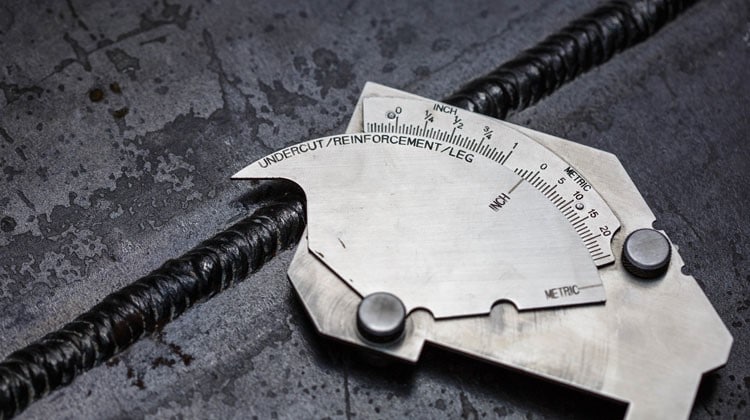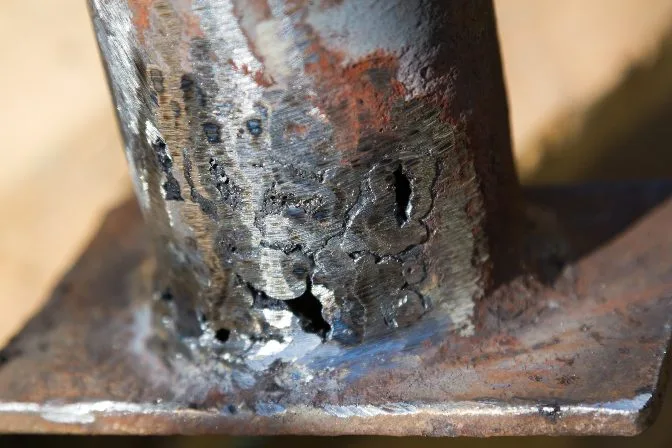Recognizing the Principles of Welding Inspection to Ensure Quality and Safety
In the world of contemporary design, welding assessment stands as a cornerstone for making sure both the top quality and security of architectural developments. What are the subtleties of these inspection techniques that make them essential for keeping architectural stability?

Relevance of Welding Inspection
In the realm of commercial manufacture, the significance of welding evaluation can not be overemphasized. Welding examination plays a critical function in guaranteeing the stability, safety and security, and long life of bonded structures. Offered the varied applications of welding in sectors such as construction, automotive, aerospace, and shipbuilding, the need for strict high quality control procedures is vital. Correct examination ensures that welds fulfill defined criteria and codes, which is crucial for protecting against architectural failings that can bring about tragic effects.
The process of welding naturally includes complicated variables, including temperature level, product homes, and ecological conditions, every one of which can influence the top quality of the weld. A detailed examination determines defects such as splits, porosity, and incomplete blend, which can jeopardize the strength and dependability of the weld. By identifying these problems early, corrective activities can be taken, consequently decreasing the risk of failing and associated prices.
Additionally, welding inspection adds to regulatory conformity, as numerous sectors are regulated by rigorous security criteria and guidelines. Failing to adhere to these laws can result in lawful liabilities and punitive damages. Ultimately, welding examination not only safeguards physical structures yet also maintains and shields human lives industry credibilities.

Trick Welding Inspection Techniques
Although welding examination is critical to guaranteeing the high quality and safety and security of bonded frameworks, it is the particular techniques utilized that figure out the performance of the examination procedure. Key welding inspection methods can be generally classified right into non-destructive screening (NDT) and destructive screening. Non-destructive screening approaches such as aesthetic examination, ultrasonic screening, radiographic testing, magnetic bit testing, and liquid penetrant testing are mainly used to assess the buildings of a weld without creating damages. Visual evaluation is typically the initial step, involving a complete assessment of the weld's surface for problems like splits or porosity.
Magnetic bit testing and liquid penetrant screening are surface area examination methods utilized to find surface area and near-surface problems. These thorough examination approaches make certain that welds meet market standards and safety and security requirements, thus making sure architectural integrity and efficiency.
Duty of Qualified Inspectors
Certified inspectors play a critical function in the welding assessment procedure, ensuring that all welds adhere to rigid market requirements and safety and security laws. Their competence is necessary in recognizing issues or abnormalities that might endanger the architectural honesty of a weld. By diligently taking a look at each weld, certified inspectors aid prevent possible failings that might cause expensive repair services or harmful mishaps.
To come to be licensed, examiners should undergo extensive training and testing, which acquaints them with numerous welding techniques, products, and screening techniques. This extensive knowledge permits them to examine weld high quality effectively and make educated judgments regarding their security and reliability. In addition, licensed inspectors excel in analyzing plans and specifications, ensuring that the welding job lines up with the project's style requirements.
An important component of their duty is to document their searchings for thoroughly, supplying a detailed document of the inspection process. This documents is important for traceability and liability, functioning as an official record of compliance with industry criteria. Licensed assessors also play a crucial role in assisting in interaction between job stakeholders, supplying referrals and understandings to improve welding methods and end results. Their contribution is important in keeping high levels of high quality and security in welding procedures.

Tools Made Use Of in Welding Examination
Welding assessors count on a selection of specialized tools to do their responsibilities efficiently, guaranteeing each weld meets the necessary criteria. Amongst these tools, visual evaluation aids like amplifying glasses and mirrors are essential, allowing assessors to very closely take a look at welds for surface defects such as splits, porosity, and undercut. Calipers and fillet weld assesses are important for determining weld dimensions to verify conformity with design requirements.
Advanced devices extend past visual aids, consisting of non-destructive testing (NDT) tools. Ultrasonic screening devices are crucial in discovering subsurface defects, making use of acoustic waves to reveal interior suspensions without endangering the weld's stability. Radiographic testing utilizes X-rays or gamma rays to record images of a weld's inside, highlighting potential issues.
Magnetic particle screening is another important tool, especially find more info for detecting surface and near-surface discontinuities in ferromagnetic materials. By using magnetic fields and ferrous fragments, assessors can determine imperfections that could otherwise be undetectable.
Dye penetrant examination is typically used for non-ferrous materials, supplying a contrast-enhanced aesthetic check for surface-breaking flaws. Welding Inspection Madison. With each other, these devices enable welding examiners to adequately evaluate weld quality, ensuring safety and integrity in various applications across markets
Making Certain Structural Integrity

Welding treatments should stick to established criteria and codes, such as those defined by the American Welding Society (AWS) or the International Company for Standardization (ISO) These guidelines guarantee that the welds can withstand environmental variables and functional stresses. Certified and accredited welders play an essential duty in this process, as their proficiency makes certain that methods are used properly, decreasing flaws such as cracks, porosity, and incomplete blend.
Post-weld examination is an additional important element of validating architectural integrity. These evaluations verify that the welds satisfy the called for top quality criteria, providing assurance of their sturdiness and dependability.
Verdict
The basics of welding evaluation are essential for keeping the high quality and safety and security of bonded structures. The usage of specialized tools additionally enhances the examination process, inevitably securing human lives and prolonging the lifespan of welded building and constructions.
Welding evaluation plays a critical duty in making certain the honesty, security, and durability of bonded structures.Although welding assessment is crucial to guaranteeing here the quality and security of bonded structures, it is the particular approaches employed that figure out the performance of the evaluation procedure. Trick welding evaluation techniques can be generally categorized into non-destructive testing (NDT) and devastating screening.Certified examiners play a crucial role in the welding evaluation procedure, making certain that all welds comply with strict market criteria and safety regulations.The fundamentals of welding assessment are essential for maintaining the high quality and security of bonded frameworks.
Comments on “Essential Tips for Effective Welding Inspection Madison Solutions”